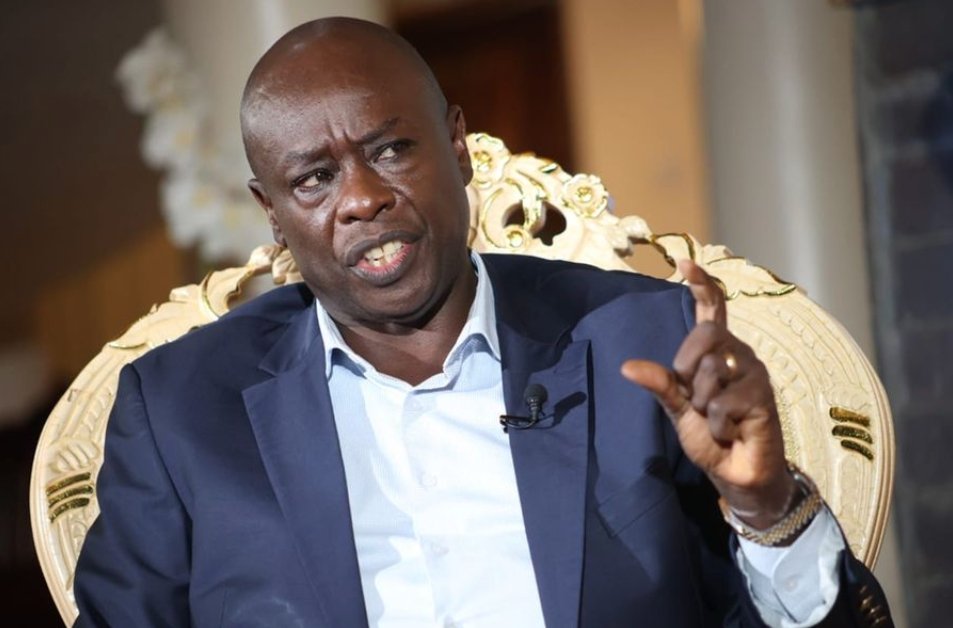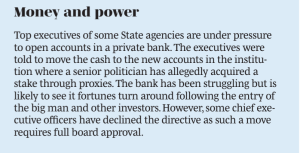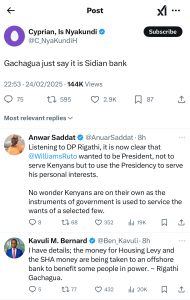Business
Rigathi Drags Sidian Bank, Owned by Centum, into SHA Housing Levy Scandal Amid Ties to Ruto

In a bombshell interview on KTN News this Monday, former Deputy President Rigathi Gachagua threw a Molotov cocktail into the heart of Kenya’s already embattled financial and political landscape.
Without naming names—or banks—he hinted heavily at a shadowy scheme involving a senior official in President William Ruto’s administration, a recently acquired local bank, and the contentious Housing Levy and Social Health Insurance Fund (SHIF) contributions. “I know these things because I was there when they were happening,” Gachagua declared, his tone dripping with insider gravitas.
The implication? A powerful figure has snapped up a financial institution to funnel billions from these controversial programs, leaving Kenyans buzzing with speculation—and one name keeps surfacing: Sidian Bank.
Gachagua’s cryptic revelations didn’t explicitly finger Sidian, but the rumor mill didn’t need a map to connect the dots.
“There’s a bank that the people in power have bought, and the housing levy funds have been kept there—close to Kes 100 billion has been collected so far,” he alleged.
The timing, he claimed, was suspiciously convenient: the acquisition happened “just when they had entered office.”
Social media lit up almost instantly, with sharp-eyed Kenyans pointing to Sidian Bank—a tier-III lender with a tangled ownership history and whispers of high-level ties—as the likely suspect. Could this be the financial vault where Kenya’s hard-earned contributions are being stashed?
A Bank in the Spotlight: Sidian’s Murky Ownership Trail
Sidian Bank, formerly K-Rep Bank, has long been a player in Kenya’s financial scene, serving small-to-medium enterprises and the urban poor since its founding in 1984. But its ownership saga reads like a corporate thriller.
In 2015, Centum Investment Company swooped in, acquiring a majority stake and rebranding it as Sidian in 2016. Fast forward to 2023, and the plot thickened: Centum offloaded a hefty 38.91 percent chunk to a consortium of local and UAE-based investors, reducing its hold to 44.52 percent through its subsidiary, Bakki Holdco Limited.
The deal, valued at Sh1.98 billion for Centum alone, saw Pioneer General Insurance Limited—backed by shadowy UAE firms like Abcon International LLC, Parkview Investments Limited, and Medillon Trading FZE—emerge as a key shareholder with a 20 percent stake.
The UAE connection raised eyebrows, but Gachagua’s allegations add a spicier twist: was this sale a front for a powerful Kenyan figure pulling strings behind the scenes? “The bank was bought by the said senior official through his proxies,” he claimed, leaving just enough ambiguity to dodge a lawsuit while fueling the fire.
Business Daily reported in April 2024 that the original founders and individual shareholders pocketed Sh841.66 million in the sell-off, with K-Rep Group and others cashing out entirely.
Sidian’s valuation then stood at Sh5.08 billion—a modest sum for a bank now allegedly sitting on a multibillion-shilling jackpot.
The SHA and Housing Levy Quagmire: A Scandal Waiting to Explode
Gachagua’s bombshell lands amid a storm of public outrage over the Housing Levy and SHIF—two flagship Ruto administration programs mired in controversy.
The Housing Levy, a 1.5 percent salary deduction aimed at funding affordable homes, has been a lightning rod since its inception under the Finance Act 2023.
Critics, including Gachagua himself, have called it “a deception disguised as job creation,” arguing it burdens salaried workers while offering little tangible benefit.
The High Court struck it down as unconstitutional in November 2023, citing its discriminatory targeting of formal-sector employees, only for the government to resurrect it via the Affordable Housing Act 2024—prompting fresh lawsuits from groups like the Kenya Human Rights Commission.
SHIF, its healthcare twin, fares no better. Replacing the National Health Insurance Fund (NHIF), it demands 2.75 percent of monthly salaries, sparking accusations of inefficiency and opacity.
President Ruto has touted both as pillars of his Universal Health Coverage and housing agendas, but the rollout has been a mess—plagued by delays, corruption allegations, and public distrust.
The Federation of Kenya Employers warned in January 2025 that these deductions, combined with PAYE and other taxes, devour up to 45 percent of workers’ paychecks, leaving many with “less than one-third of their salary.”
Gachagua’s claim that nearly Sh100 billion from these schemes is parked in a single bank only deepens the suspicion of a grand heist.
Sidian’s Convenient Role: Coincidence or Conspiracy?
Here’s where the speculation gets juicy. Eagle-eyed Kenyans on X have unearthed past ads positioning Sidian Bank as a go-to for SHIF contributions—a detail that aligns eerily with Gachagua’s hints.
Mainstream chatter has long swirled about a senior state official strong-arming parastatals to channel funds into a favored bank, a rumor that’s gained traction since Centum’s partial exit from Sidian.
Posts on X from February 24, 2025, amplify the buzz: “Riggy G claims Ruto bought a bank for affordable housing and SHIF cash. KOX KOT say it’s Sidian. True?” Another quipped, “All the levies deposited to a bank owned by Kasongo—he’s trading with our money while supplying hardware too. Devil incarnate.”
Sidian’s financials don’t scream “cash cow” on the surface— it posted a Sh447.96 million net loss in 2023—but its access to long-term financing from entities like the East African Development Bank and Dutch FMO suggests it’s well-positioned to handle big inflows.
Could it be the perfect vessel for a high-stakes money shuffle? Gachagua’s refusal to name the bank keeps the story legally slippery, but the breadcrumbs lead straight to Sidian’s door.
Ruto’s Shadow and Political Fallout
The unspoken target of Gachagua’s ire? President Ruto himself. Their fallout—culminating in Gachagua’s impeachment in October 2024—has turned the ex-deputy into a loose cannon, eager to spill tea on the administration he once helped lead.
His claim that the bank purchase coincided with their 2022 entry into office points to a calculated move by someone at the top.
Ruto’s defenders, including the man himself, have shrugged off such attacks, with the President embracing his “Zakayo” tax-collector nickname and vowing to push ahead with his agenda. “Even if they call me Zakayo, so long as I deliver, I have no problem,” he said in Busia on January 23, 2025.
Yet, the stakes are soaring. Kenya’s economy is reeling from inflation, debt, and a restive workforce fed up with shrinking payslips. Gachagua’s warning that “3.3 million taxpayers could sway the 2027 election” looms large, especially if voters connect the dots between their deductions and an alleged banking bonanza.
If Sidian—or any bank—is indeed a Ruto-linked piggy bank, the fallout could dwarf past scandals.
The Verdict: Smoke, Mirrors, and Billions
For now, Gachagua’s allegations remain just that—tantalizing hints wrapped in plausible deniability. Sidian Bank hasn’t commented, and Centum’s silence only thickens the intrigue.
But the pieces fit too neatly to dismiss: a bank with fresh UAE and local owners, a government desperate for cash, and a former insider crying foul.
Whether it’s Sidian or another player, one thing’s clear: the Housing Levy and SHIF scandals are far from over. Kenyans, already squeezed dry, deserve answers—and they’re watching closely.
As the rumor mill churns and lawsuits pile up, this saga promises more twists. Stay tuned—because if Gachagua’s right, the lid on this financial Pandora’s box is barely screwed on.
Kenya Insights allows guest blogging, if you want to be published on Kenya’s most authoritative and accurate blog, have an expose, news TIPS, story angles, human interest stories, drop us an email on [email protected] or via Telegram
-

 News7 days ago
News7 days agoKenyan Driver Hospitalized After Dubai Assault for Rejecting Gay Advances, Passport Seized as Authorities Remain Silent
-

 Business2 weeks ago
Business2 weeks agoKakuzi Investors Face Massive Loss as Land Commission Drops Bombshell Order to Surrender Quarter of Productive Estate
-

 Business1 week ago
Business1 week agoConstruction Of Stalled Yaya Center Block Resumes After More Than 3 Decades and The Concrete Story Behind It
-

 Investigations2 weeks ago
Investigations2 weeks agoINSIDER LEAK REVEALS ROT AT KWS TOP EXECUTIVES
-

 Investigations2 days ago
Investigations2 days agoMoney Bior, Lawyer Stephen Ndeda Among 18 Accused Of Running An International Fraud Ring Involved With Scamming American Investor Sh500 Million
-

 Investigations2 weeks ago
Investigations2 weeks agoCNN Reveals Massive Killings, Secret Graves In Tanzania and Coverup By the Govt
-

 Business2 weeks ago
Business2 weeks agoBANKS BETRAYAL: How Equity Bank Allegedly Helped Thieves Loot Sh10 Million From Family’s Savings in Lightning Fast Court Scam
-

 Investigations1 week ago
Investigations1 week agoHow Somali Money From Minnesota Fraud Ended In Funding Nairobi Real Estate Boom, Al Shabaab Attracting Trump’s Wrath




























